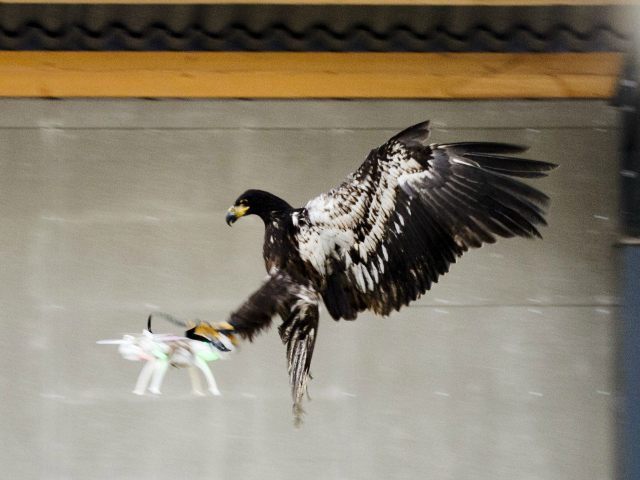The Turkish government has announced an interest in adopting an eagle-training program currently in use in the Netherlands, which teaches eagles how to capture unmanned drones mid-air, allowing for a rapid elimination of the threat of any rogue flying objects.
The news comes a month after Turkey’s General Directorate of State Airports Authority (DHMİ) announced the implementation of regulations to classify and monitor the number of civilian-owned drones flying in the nation.
“With a fresh international regulation, it has finally become a must for drones to be registered. At least we will know whose drones fly above us,” DHMI head Serdar Hüseyin Yıldırım said Sunday. In cases of unidentified drones breaching sensitive areas, he added, “the most effective method to ease this threat over civil aviation traffic is the use of eagles, which are quite good at catching drones.” “This method is now used in the Amsterdam Schiphol Airport. We are evaluating this idea to implement at our airports as well,” he noted, according to Turkey’s Hurriyet newspaper.
In February, the Dutch company Guard from Above announced an extensive program designed to train eagles and other large birds of prey on how to capture drones mid-air and render them inoperable, calling eagles “a low-tech solution for a high-tech problem.” The program boasts at least one fully-trained eagle that can attack and capture unmanned drones on command. It is unclear whether they will limit the program to one species of eagle or expand it to other birds of prey, like falcons and hawks.
While the program has received support in the Netherlands, some biologists warn that the birds, many species of which remain endangered, may not be naturally disposed to such an attack and could be significantly threatened in a fight with a drone. “I really don’t think being drafted into a robot-fighting army is in the best interest of America’s national bird,” writes Nicholas Lund at National Geographic. “If an eagle were to misjudge its attack, or if the drone operator were to take evasive or defense maneuvers, a bird could be struck by the blades and seriously injured or killed,” he argues, citing avian experts noting that eagles, unlike “falconry birds” who snatch prey out of midair; instead, eagles attack fish and creatures that live on the ground. “It’s dangerous because drones are not like anything bald eagles or other birds of prey find in nature,” Kent Knowles, president of the Raptor Conservancy of Virginia, says.
Despite the potential threats, governments are increasingly interested in investing in technology to prevent unlicensed drones from potentially being used in a terrorist attack. The International Air Transport Association issued a statement earlier this year warning that drones may become a “real and growing threat” to commercial flights. “I am as excited as you are about the prospect of having pizza delivered by a drone… but we cannot allow them to be a hindrance or safety threat to commercial aviation,” IATA director-general Tony Tyler, said at a conference in February.
In addition to threats from civilians unknowingly causing civil aviation troubles, many in Turkish government are concerned that terrorists will use them to carry out attacks. Multiple reports in Turkish media suggest that members of the Kurdistan Workers’ Party (PKK), a Marxist terrorist organization, have access to drone technology. The government has confirmed the discovery of at least one drone in PKK hands this year.
Turkish authorities are blaming the PKK for a car bomb explosion in the capital, Ankara, on Sunday, which killed 37 and injured over 100 others. A female PKK militant has been identified as the main culprit in the bombing, though the PKK itself has not taken responsibility for the attack. Earlier this month, two female terrorists identified as members of the Revolutionary People’s Liberation Army-Front (DHKP-C), a Marxist terrorist group, were killed after attacking a police station in Istanbul using grenades.
Partially in response to the IATA’s urging, and partially to reports that the PKK may use them, the Turkish government implemented a series of regulations on drone operators in February, the first of their kind in the nation. The Drone Mandate requires all drones used outdoors to be registered with the government and prohibits them from flying within nine kilometers of airports and other sensitive areas.

COMMENTS
Please let us know if you're having issues with commenting.